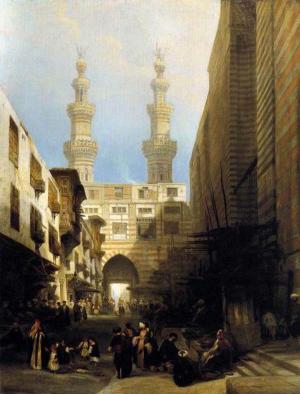| Author: | George Manville Fenn | ISBN: | 9781465620897 |
| Publisher: | Library of Alexandria | Publication: | March 8, 2015 |
| Imprint: | Language: | English |
| Author: | George Manville Fenn |
| ISBN: | 9781465620897 |
| Publisher: | Library of Alexandria |
| Publication: | March 8, 2015 |
| Imprint: | |
| Language: | English |
Two middies talking in the stern-sheets of the cutter belonging to Her Majesty’s fast little cruiserNautilus, stationed on the west coast of Africa “blackberrying,” so the men called their duty, Tom Fillot, one of their jokers, giving as the reason that the job was “black and berry nasty.” The sun shone as it can shine in the neighbourhood of the equator, and the sea looked like so much glistening oil, as it slowly heaved up and sank with the long ground swell, the light flashing from the surface attacking the eyes with blinding power, bronzing the faces of some, peeling the noses of others. Setting aside the smart crew of the cutter in their white duck shirts and trousers and straw hats, with faces, necks, and hands of a mahogany brown, the two speakers may be taken as fair samples of what the sun could do with a fresh-coloured English lad of sixteen or seventeen. Mark Vandean, who leaned back and had wrenched himself round to sharply adjure something behind him in the bottom of the boat, was burned of a good warm Russian leather brown, while his companion, Bob Howlett, who held the rudder-lines, displayed in addition to ruddy brown cheeks a nose in a most disreputable state of rag. The boat went swiftly through the water, as the men bent with regular stroke, and made the tough ash blades of their oars curve ere they rose and scattered the flashing drops, which seemed to brighten the scene where all was flat and monotonous, and the view contracted by a dead silvery haze of heat. Behind them was the low flat shore with a few scattered white houses and factories behind a rough landing-stage. There were palms of different kinds in a straggling line, and on either side of the opening out of a muddy river, a bordering of dingy green mangroves—tree cripples, Mark Vandean called them, because they all looked as if standing up on crutches. A few boats lay in the mouth of the river, a dissolute-looking brig with its yards unsquared was at anchor higher up, and a sharp eye could detect a figure or two about the beach. On either side, as far as eye could reach, there was a line of surf. That was all shoreward, while out to sea, a couple of miles or so away, smart and business-like, with her tall spars and carefully squared yards and rigging, cobweb-like in texture at that distance, lay at anchor in the open road-stead HMS Nautilus waiting to gather “blackberries” at the first opportunity, and toward which smart little vessel the cutter was being steadily propelled. The object ordered to lie still under pain of being pitched overboard did not lie, but crouched a little lower, and increased the wrinkles in its deeply lined forehead, above which was a thin fringe of hair, blinked its wondering eyes, and looked piteously at the speaker.
Two middies talking in the stern-sheets of the cutter belonging to Her Majesty’s fast little cruiserNautilus, stationed on the west coast of Africa “blackberrying,” so the men called their duty, Tom Fillot, one of their jokers, giving as the reason that the job was “black and berry nasty.” The sun shone as it can shine in the neighbourhood of the equator, and the sea looked like so much glistening oil, as it slowly heaved up and sank with the long ground swell, the light flashing from the surface attacking the eyes with blinding power, bronzing the faces of some, peeling the noses of others. Setting aside the smart crew of the cutter in their white duck shirts and trousers and straw hats, with faces, necks, and hands of a mahogany brown, the two speakers may be taken as fair samples of what the sun could do with a fresh-coloured English lad of sixteen or seventeen. Mark Vandean, who leaned back and had wrenched himself round to sharply adjure something behind him in the bottom of the boat, was burned of a good warm Russian leather brown, while his companion, Bob Howlett, who held the rudder-lines, displayed in addition to ruddy brown cheeks a nose in a most disreputable state of rag. The boat went swiftly through the water, as the men bent with regular stroke, and made the tough ash blades of their oars curve ere they rose and scattered the flashing drops, which seemed to brighten the scene where all was flat and monotonous, and the view contracted by a dead silvery haze of heat. Behind them was the low flat shore with a few scattered white houses and factories behind a rough landing-stage. There were palms of different kinds in a straggling line, and on either side of the opening out of a muddy river, a bordering of dingy green mangroves—tree cripples, Mark Vandean called them, because they all looked as if standing up on crutches. A few boats lay in the mouth of the river, a dissolute-looking brig with its yards unsquared was at anchor higher up, and a sharp eye could detect a figure or two about the beach. On either side, as far as eye could reach, there was a line of surf. That was all shoreward, while out to sea, a couple of miles or so away, smart and business-like, with her tall spars and carefully squared yards and rigging, cobweb-like in texture at that distance, lay at anchor in the open road-stead HMS Nautilus waiting to gather “blackberries” at the first opportunity, and toward which smart little vessel the cutter was being steadily propelled. The object ordered to lie still under pain of being pitched overboard did not lie, but crouched a little lower, and increased the wrinkles in its deeply lined forehead, above which was a thin fringe of hair, blinked its wondering eyes, and looked piteously at the speaker.















